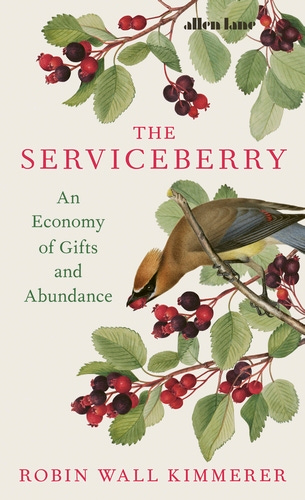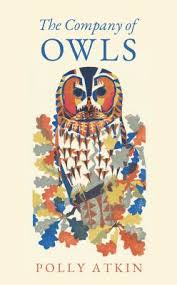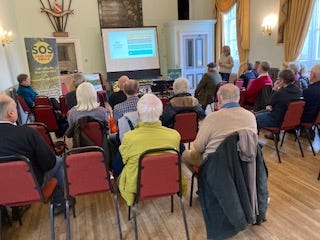River campaign aims for 2025, shooting petition progress and call to protect salt marshes
Plus some inspiring reading recommendations to snuggle up with this winter
Good morning! I’m Sarah Hartley and this is The Northern Eco weekly update. As you’ve received this newsletter then either you subscribed, or someone forwarded it to you. If the latter, then you can click on this handy little button below.
As it’s the last Tuesday of the month, we’ve the latest book recommendations with a green tinge from Claire and Alan at The Wonky Tree bookshop for you to enjoy! This will be the last for 2024 year but don’t forget, the shop is open online, 24/7 for all your Christmas reads and not just those that are recommended on the newsletter. Browse here.(Scroll down for the usual news headlines)
The Serviceberry by Robin Wall Kimmerer
Description: From the bestselling author of Braiding Sweetgrass, an inspiring vision of how to reorient our lives around gratitude, reciprocity and community. As indigenous scientist Robin Wall Kimmerer harvests serviceberries alongside the birds, she considers the ethic of reciprocity that lies at the heart of the gift economy. How, she asks, can we learn from indigenous wisdom and the plant world to reimagine what we value most?
Our economy is rooted in scarcity, competition, and the hoarding of resources, and we have surrendered our values to a system that actively harms what we love. Meanwhile, the serviceberry’s relationship with the natural world is an embodiment of reciprocity, interconnectedness, and gratitude.
The tree distributes its wealth—its abundance of sweet, juicy berries—to meet the needs of its natural community. And this distribution ensures its own survival. The Serviceberry is an antidote to the broken relationships and misguided goals of our times, and a reminder that “hoarding won’t save us, all flourishing is mutual.”
“We couldn’t beat the following quote from James Rebanks urging us to read the book. ‘The Serviceberry is a gem of a book. It invites us to think again about economics, and imagine another way of relating to one another based on generosity, kindness, interconnectedness, and restraint. The book reminds us that how we think, and the stories we tell, shape how we live – and it’s high time we thought and lived differently, with new stories, about our place in nature.’”
The Company of Owls by Polly Atkin
Description: A nocturnal love song in a world full of noise... longlisted for the Wainwright Prize for Nature Writing. In the woods above Polly Atkin's home in Grasmere, Cumbria live the tawny owls she calls her neighbours.
Each night, they come down to her cottage at dusk, calling out as night falls - in particular a trio of owlets she watches grow from fledglings to young adults. As the antics of the owl siblings develop - their capacity to play, to bicker, to share and to protect - they encourage her to think differently about some of the big needs of all our lives: solitude and companionship, care and belonging, rest and retreat. And into the frame step questions about all sorts of relationships, from how we feel when in darkness to the homes and connection we so desperately seek.
The Company Of Owls is a love song to these incredible creatures, and a reflection on what makes them, and us, unique and distinctive. It's a call to find joy in unexpected places and times. It is a lesson in learning to listen - to really listen - when all around us seems clamour and noise.
“A great invitation to quietly stand and stare and listen to the wildlife around us.”
Bothered By Bugs by Emily Gravett
Description: A very funny picture book story in which Pete the Badger, star of Emily Gravett's award-winning books Tidy and Too Much Stuff!, learns valuable lessons about the importance of all creatures, big and small, in maintaining the harmony of nature.
In Bothered By Bugs, Pete the Badger is choosing a delicious recipe from his new fruit cookbook when his peace is interrupted by a teeny tiny fly. The fly becomes a swarm and soon all the animals are being bothered by bugs and insects of all kinds – so they help Pete rid the forest of/capture every single one.
But . . .disaster! Now nobody's around to clean up the poo, and come autumn, there's not a berry or a cherry to be found. Will Pete and the other animals learn their lesson and restore order to the forest?Richly detailed, wonderfully humorous illustrations will keep readers coming back for more. Twice Kate Greenaway Medal winner Emily Gravett's delightful rhyming story is a colourful celebration of nature's equilibrium and promises fun, laughter and learning.
The perfect book to read aloud.
“This is a brilliant picture book to share - as expected the detail in Emily Gravett’s illustrations is exquisite. An engaging story with an important message at its heart!”
In river news
💦 Campaigners at Save our Swale (SOS) held a summit meeting on Sunday to discuss plans for next year’s activities and mark the achievements of all the volunteers during 2024. Towards the end of the meeting, SOS chair Deborah Meara, spoke about three campaign objectives for 2025:
Obtaining Designated Bathing Water Status (DBWS) once the new criteria are released from the government, and in the meantime erecting SOS signage to warn the public about the pollution of the Swale.
Holding Yorkshire Water, OFWAT, the EA and the government to account through activities such as Citizen Science contributions to understanding and collaborations with organisations such as the independent national Sewage Campaign Network and Surfers against Sewage.
Ensuring that Richmond Sewage Treatment Works is fit for purpose and seeking expert advice on that front.
The group also issued an invitation to Richmond MP Rishi Sunak to attend a parliamentary briefing on the Water (Special Measures) Bill in the House of Commons on the 9th December.
💦 A tunnel boring machine, named after the late comedian Victoria Wood, is part of a £25m United Utilities project to increase the capacity of storm tanks and reduce sewage emissions into the River Irwell, reports Chris Gee in the MEN.
💦 Northumbrian Water has deployed new technology for testing of chlorine, ammonia and turbidity, reports BDaily.
💦 Sewage capacity fears remain over plans for 60 homes in Bishop Monkton, reports The Stray Ferret.
The three most clicked links from last week were:
POLL: Do you support the farmers’ strike
Yorkshire town may bring first forever chemicals legal case in UK
In other news
☔️ Further disruption to road, rail, air and ferry travel is expected as Storm Bert continues to bring heavy rain and strong winds across the UK. More than 180 flood warnings are in force, several people have died, hundreds of homes flooded, and roads turned to rivers. Extreme weather events like this are becoming more common due to the climate crisis.
🌏 Interested in learning more about the climate and carbon? We’ve donated £150 worth of our training to help the Yorkshire Dales River Trust (YDRT) raise some funds. So if you make a bid in the YDRT auction, three people (maybe your work colleagues or family) can take part in that next year. Here’s the details. All proceeds will directly help the Rivers2U educational programme and volunteer programme, enabling a range of impactful activities, such as training local community members to collect water quality samples, equipping riverfly monitors, organising litter clean-ups, and managing invasive species through identification and removal.
🌏 South Tyneside Council says it is at risk of not meeting its ambitious net zero carbon targets, despite leading the way in climate, ecology and ocean recovery.
🪶 Wild Justice’s new petition calling for a ban on driven grouse shooting reached it’s first target of 10,000 signatures which means the new Labour Government is required to respond.
🚜 The issue of changes to Inheritance Tax for farmers has received wall-to-wall media coverage over the past week. So it was interestig to see that only 25% of our readers who voted in last week’s poll support the protests. 75% were against. Do you feel your viewpoint is being reflected in the media?
📸 University of Salford has announced the launch of its new Artist in Residence programme in collaboration with the RHS Garden Bridgewater. It invites visitors to experience the garden from a fresh artistic perspective, working with renowned visual artist and photographer, Dr Yan Wang Preston.
⚡️ Energy from a proposed data centre in York could be used to heat the swimming pool of the leisure centre next door under new plans, writes Joe Gerrard from the York Press.
✍️ North East Mayor Kim McGuinness and Combined Authority leaders are set to approve £17m to protect North East’s rural and coastal areas, writes at Phoebe Abruzzese at The Northern Echo. Set over 3,000 squares miles, the North East is home to "world-class" rural and coastal landscapes and attractions, including Northumberland National Park, two National Landscape areas in Northumberland Coast and the North Pennines, and over 500km of coastline.
🦋 “All the academics have suddenly migrated to Bluesky,” says Bethan Davies, a glaciologist at Newcastle University, UK. The platform has “absolutely exploded”. writes Smriti Mallapaty at Nature. So it’s good to hear I won’t be alone over there after deciding to mothball the X accounts and join the exodus. More on that here.
🪺 A warrant has been executed in connection to illegal trading of birds’ eggs. The operation was supported by the National Wildlife Crime Unit (NWCU), who worked alongside South Yorkshire motorcycle and rural crime team, neighbourhood officers and other specialist roles including search officers and digital media investigators. South Yorkshire Police Press Release.
🔵 A Blue Plaque has been unveiled to mark the 75th anniversary of the passing of National Parks and Access to the Countryside Act. Joe Willis reports on the ceremony at RichmondshireToday.
🌿 Researchers in Yorkshire are warning of the major impact that future losses of salt marshes could have for both carbon emissions and biodiversity, Michael Crossland at The Yorkshire Post reports.
The new month is fast approaching and we’ll have the usual round-up of eco events to share this Friday. If you’re organising an eco event in December, please do let us know ASAP.
That’s it for this week but we’ll be back as usual next Tuesday. Stay warm!
🌼 Thank you for reading edition number 107 of The Northern Eco. This newsletter remains independent, free unless you want to pay, ad-free and proudly reader supported thanks to paying subscribers. The main newsletter is sent out at 7am on a Tuesday and can’t exist without paying subscribers. Please do subscribe to keep it going - I can’t do it without your support. Thanks!










